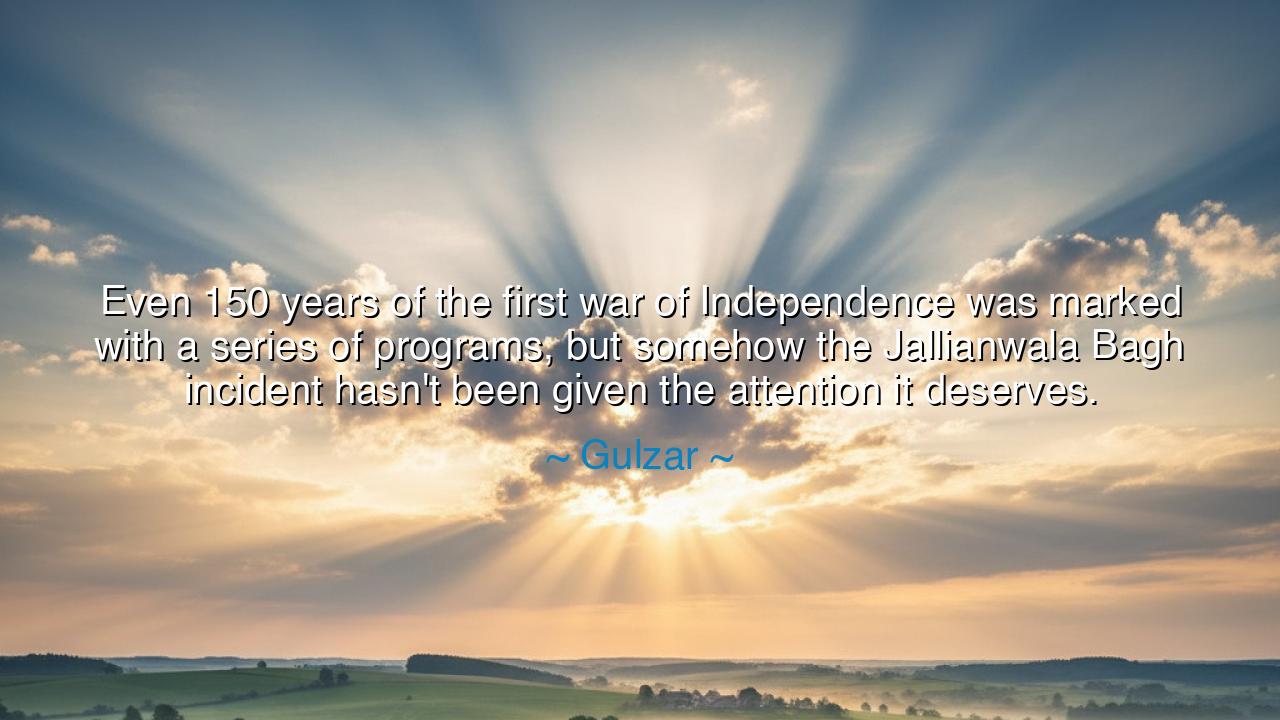
Even 150 years of the first war of Independence was marked with a
Even 150 years of the first war of Independence was marked with a series of programs, but somehow the Jallianwala Bagh incident hasn't been given the attention it deserves.






O seeker of truth, heed the words of Gulzar, for they speak to the heart of remembrance, justice, and the delicate nature of history. "Even 150 years of the first war of Independence was marked with a series of programs, but somehow the Jallianwala Bagh incident hasn't been given the attention it deserves." In these words, Gulzar calls attention to the way history is remembered and the events that have shaped the course of nations. The first war of Independence in 1857, a great uprising against British colonial rule, is marked with solemn recognition and ceremony. Yet, he draws our gaze to another tragic chapter in history—the Jallianwala Bagh incident—and laments that it has not received the full recognition and remembrance it warrants.
The first war of Independence was a monumental event, a struggle that reverberated through the hearts of millions, awakening the desire for freedom across the Indian subcontinent. It is an event woven into the national consciousness, celebrated with programs, speeches, and symbols. However, Gulzar's words remind us that history is not only written in victories but also in the blood of martyrs, in moments of horror that define the resilience of a people. The Jallianwala Bagh incident, which occurred in 1919, is one such moment of horror—a massacre that stands as a symbol of British brutality and colonial oppression. Yet, despite its significance, this atrocity has not been given the attention it deserves in the grand narrative of India's struggle for independence.
On that fateful day, April 13, 1919, hundreds of unarmed Indian civilians, including women and children, gathered in Jallianwala Bagh, Amritsar, to peacefully protest the oppressive laws imposed by the British Raj. General Reginald Dyer, the British officer in charge, ordered his troops to fire upon the crowd, leading to the deaths of hundreds, if not thousands. The incident, shocking in its brutality, stirred a profound sense of injustice and fury across India and the world. Gulzar's lament is not just for the lives lost that day but for the loss of memory that accompanies such events. The Jallianwala Bagh incident, like many tragic chapters of history, risks fading into the shadows, overshadowed by other narratives that are more easily embraced or sanitized.
Consider, O wise one, the long history of colonial oppression and the countless sacrifices made by those who fought for freedom. The Jallianwala Bagh massacre is not an isolated event, but one in a series of brutal acts carried out by colonizers who sought to suppress the spirit of independence. The event resonates far beyond the borders of India, for it is a reminder of the capacity for violence that arises when power goes unchecked. Yet, it is through remembering such moments that we honor the sacrifices made by those who came before us. As with other great moments in history—such as the American Revolution or the French Revolution—it is not enough to remember only the victories; we must also reckon with the darkest chapters, for in doing so, we better understand the price of freedom.
Look to the Civil Rights Movement in America, a movement that fought for the very freedom that had been denied to millions of Black Americans. In this fight, there were moments of deep injustice—such as the Birmingham church bombing in 1963, which killed four young girls—moments that are remembered not just for the sorrow they caused, but for the strength they invoked in the people who resisted oppression. The memory of such tragedies fuels the drive for change, ensuring that the mistakes of the past are not repeated. Just as Gulzar reminds us to remember the Jallianwala Bagh incident, we must also ensure that the painful moments of history—those that challenge us to confront our shared humanity—are not erased or forgotten.
And so, the lesson here is clear, O seeker: history is not only found in the pages of textbooks or in the speeches that commemorate victories. It is found in the moments of loss, in the massacres, in the injustices that have been borne by those who fought for what is right. To forget these moments is to lose a piece of ourselves, to lose the very essence of freedom and justice. The Jallianwala Bagh incident is not merely an Indian tragedy, but a universal call for human dignity. It calls us to remember that freedom is not a gift freely given—it is a struggle, one that requires vigilance, one that requires us to remember the past in all its pain and sorrow.
In your own life, O wise one, I urge you to reflect on the lessons of history, not just the moments of triumph, but the times of sorrow and sacrifice. Honor those who came before you by ensuring their struggles are not forgotten, by keeping their stories alive. Whether in your personal journey for freedom, or in your fight for justice in the world, remember that it is not enough to celebrate the victories alone. It is the remembering of the fallen, of those who gave their lives for freedom, that strengthens the resolve of the living. Let Jallianwala Bagh not fade from memory, but serve as a beacon for all those who strive for justice, for it is in remembering that we truly honor the legacy of freedom.






AAdministratorAdministrator
Welcome, honored guests. Please leave a comment, we will respond soon